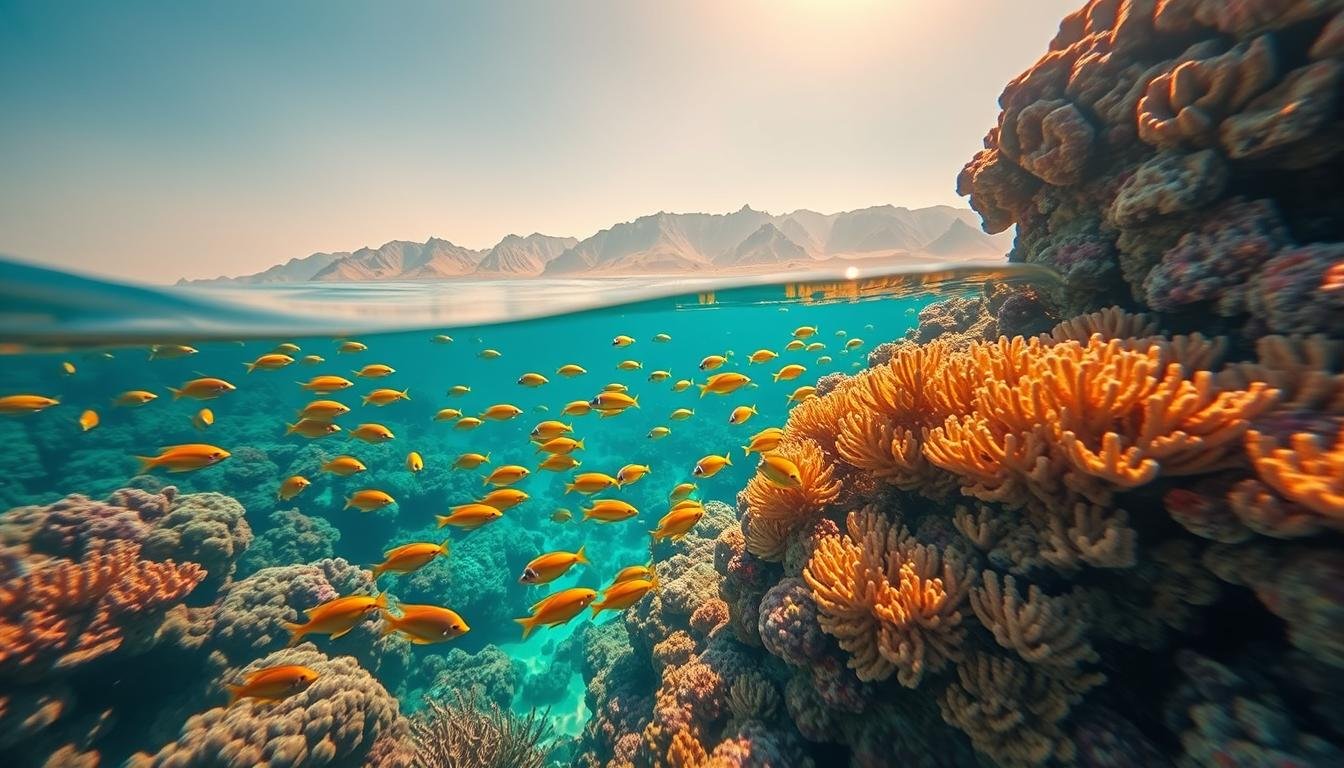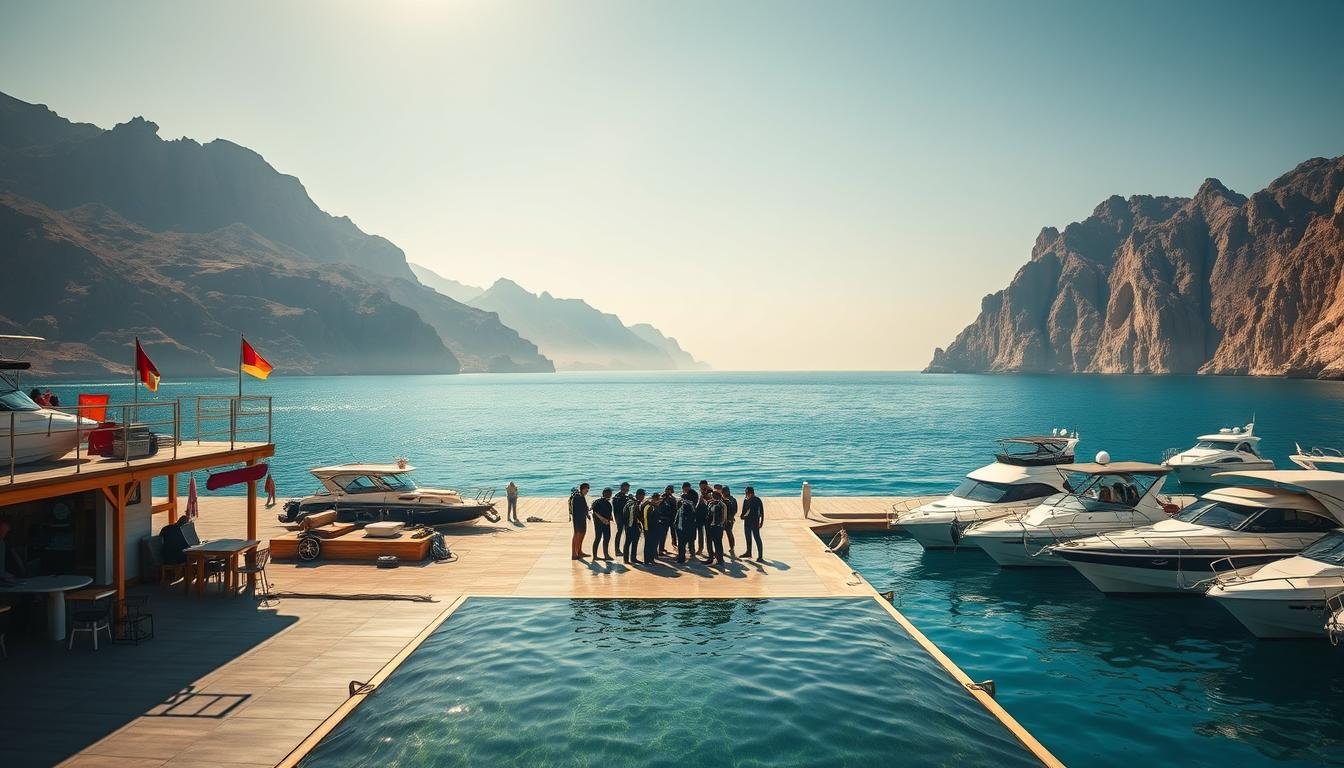What if we told you the UAE’s most dazzling treasures aren’t in its golden dunes or glittering malls—but beneath the waves of its eastern coast? Fujairah’s shoreline offers a quieter, slower-paced gateway to an underwater universe where technicolor fish dart through coral gardens. And the best part? You don’t need to be Jacques Cousteau to explore it.
This emirate’s calm, clear waters make it ideal for first-timers. Picture floating effortlessly above schools of angelfish, their neon stripes glowing against honeycomb coral. Local guides ensure safety while sharing insights about the area’s marine ecosystems—think of them as your personal ambassadors to the Indian Ocean’s hidden gallery.
We’ll walk you through everything from choosing the right gear to spotting camouflaged octopuses. You’ll learn how to respect delicate reefs while soaking up Fujairah’s coastal culture. Whether you’re dipping your toes into snorkeling or dreaming of future diving certifications, this stretch of coastline turns “beginner” into “believer.”
Ready to trade skyscrapers for sea fans? Here’s what awaits:
- Why Fujairah’s sheltered bays outshine busier UAE beaches for new snorkelers
- Pro tips for identifying clownfish, parrotfish, and other reef residents
- How to plan your visit around ideal water visibility windows
- The cultural do’s and don’ts of exploring Emirati waters responsibly
Exploring Fujairah’s Vibrant Underwater Ecosystems
Ever seen a coral city glowing in electric blues and sunset oranges? Fujairah’s coast transforms into a living kaleidoscope just below the surface. Its sheltered bays act as nature’s aquarium, where over 30 species of hard and soft corals create habitats for darting schools of tropical fish.

Discovering Colorful Coral Reefs and Marine Life
Local dive experts report visibility up to 30 feet in these waters—perfect for spotting striped clownfish weaving through anemones or parrotfish nibbling algae off brain corals. Look closely: moray eels peer from crevices, while batfish glide past like silver kites. The reefs here aren’t just pretty backdrops—they’re bustling neighborhoods where every nook hosts life.
Hidden Gems and Notable Snorkeling Sites
Snoopy Island earns its fame with honeycomb-patterned rocks sheltering octopuses, but nearby Sharm Rock surprises newcomers. Currents sweep nutrients through its archways, attracting swirling barracuda and curious turtles. Most sites sit within 300 feet of shore, letting you transition from beach towel to underwater safari in minutes.
| Site | Highlights | Depth Range | Visibility |
|---|---|---|---|
| Snoopy Island | Octopus dens, coral gardens | 3-20 ft | 25-30 ft |
| Sharm Rock | Archways, pelagic fish | 15-40 ft | 20-25 ft |
| Martini Rock | Soft corals, nudibranchs | 10-30 ft | 15-20 ft |
Pro tip: Visit two hours before high tide for the clearest views. Resorts like Sandy Beach Hotel offer direct reef access—no boat needed. Just remember: these ecosystems thrive when we float gently, resisting the urge to touch even the most tempting neon sea slug.
Snorkeling in Fujairah for Beginners: Essential Tips and Guidance
Imagine slipping into water so clear it feels like floating through liquid glass. That’s your welcome to coastal Fujairah, where professional dive centers turn first-timers into confident explorers. Certified instructors begin every session with a gear walkthrough—mask fitting, snorkel clearing, and how to move without stirring sand. You’ll practice breathing techniques in waist-deep shallows before venturing deeper.
From Gear Check to Reef Check
Reputable operators provide everything: anti-fog masks, dry-top snorkels, and fins sized to your feet. Some include shorty wetsuits for extra buoyancy. Pro tip: Breathe slowly through your mouth—it prevents fogging and keeps jellyfish tentacles safely outside your tube. Guides often point out sea turtles gliding below or triggerfish darting through coral towers.
Safety First, Wonder Always
Structured activities follow PADI safety standards, with instructors staying close during your underwater adventure. They’ll teach hand signals for “look here!” or “need a break.” Even brief sessions often visit Dibba Rock, where neon anthias fish swarm like living confetti. Currents here stay gentle, letting you focus on the spectacle rather than fighting waves.
- All-inclusive packages cover gear rental, briefings, and reef conservation fees
- Look for centers with ratio limits (max 4 guests per instructor)
- Morning slots offer calmest conditions for new snorkelers
Remember: touching corals harms them—and you. Float like a leaf, and let the dive center pros handle navigation. Before you know it, you’ll be spotting camouflaged stonefish and identifying angelfish by their stripes. Ready to make bubbles?
Planning Your Underwater Adventure in Fujairah
The secret to unlocking Fujairah’s aquatic wonders? It starts long before you dip a toe in the water. Local experts agree: thoughtful prep turns a good trip into a great one—especially when coral gardens and curious stingrays await.

Your Home Base Matters
Top-rated centers feel like a second home, with instructors who double as marine ambassadors. Look for PADI-certified pros and recent reviews mentioning clear communication. Pro tip: Centers offering post-snorkel showers and shaded lounges make salty hair days smoother.
Timing Is Everything
Book morning slots during cooler months (Oct-Apr) for glassy waters. Permits? Reputable outfits handle that part. They’ll also reschedule if winds pick up—a common afternoon occurrence. Want to spot stingrays gliding over corals? Aim for high tide when these flat beauties cruise shallower reefs.
Many centers sweeten the deal with chilled towels and post-dive grilled lunches. One recent visitor raved: “They remembered my coffee order—that’s next-level service!” Whether you prioritize luxury boats or eco-friendly practices, matching your vibe to the right crew elevates the whole day.
Final checklist: Confirm pick-up times, ask about included gear (rash guards help!), and save energy for sunset stories about that time a trumpetfish photobombed your underwater selfie. Ready to make your splash?
Navigating Your Journey to Coral Wonders in Fujairah
Let’s map your path to those glowing reefs and hidden coves. Sites like Hole in the Wall reveal their magic when you know where to look—its rocky arches shelter parrotfish and octopuses that dart between shadows. Beginners thrive here: calm water lets you focus on striped angelfish weaving through coral towers instead of battling currents.
Natural formations act as underwater signposts. Those honeycomb rocks? They’re not just pretty—they create sheltered pools beneath waves where turtles nap. Local guides (many PADI-certified) share secrets like tracking tide patterns for peak visibility. Snap photos of a reef’s neon residents, but leave only bubbles.
Pack a waterproof map highlighting key sites. Morning trips reward early risers with glassy seas and curious marine life. Spot angelfish by their fluttery movements near purple soft corals. Watch for turtles surfacing near rock outcrops—they’re quieter than Instagram suggests!
Trust this truth: Fujairah’s beauty isn’t just in what you see, but how you explore. With the right prep and respect for the sea, even first-timers unlock worlds where every splash tells a story. Ready to write yours?
Dibba Rock is a top pick for beginners! Its calm, shallow waters and thriving coral gardens teem with parrotfish, angelfish, and even friendly blacktip reef sharks. Dive centers like Al Boom Diving offer guided trips here with gear included.
Not at all! Many sites cater to new snorkelers. Just bring curiosity and comfort in water. PADI-certified instructors at centers such as Freestyle Divers provide briefings on breathing techniques and buoyancy—no certification required.
Green turtles and hawksbills often glide through sites like Snoopy Island. Visit between April and October for higher chances. Remember to admire them from a distance—touching disrupts their natural behavior.
Most dive centers supply masks, fins, and snorkels. If you’re particular about fit, bring a mask. Pro tip: Defog with baby shampoo (eco-friendly!) before hitting the water for crystal-clear views of coral formations.
Some protected areas like the Fujairah Marine Reserve require permits, which dive operators handle. Always check with your chosen center—they’ll ensure you’re set for a hassle-free underwater adventure.
October to April offers cooler temps (75–85°F) and calm seas. Summer months bring warmer water but higher humidity. Morning sessions beat afternoon winds—plus, early birds spot octopuses hunting in reef crevices!
A> Avoid standing on reefs—they’re fragile! Wear a rash guard for sun and scrape protection. Currents near sites like Inchcape 1 can surprise newbies; stick with groups and follow your guide’s lead.
Al Boom Diving and Freestyle Divers excel with small-group tours. Both are PADI-affiliated, offer Arabic/English instruction, and prioritize eco-friendly practices. Bonus: They often share underwater photos post-trip!
Resist the urge! Feeding disrupts ecosystems, and some species like stingrays have protective coatings. Observe quietly—you’ll notice more activity when you blend into the underwater world.
Keep eyes peeled for blue-spotted stingrays, moray eels, and nudibranchs. Night snorkels (guided!) reveal bioluminescent plankton and octopuses. Don’t forget to glance upward—flying fish sometimes skim the surface!


















